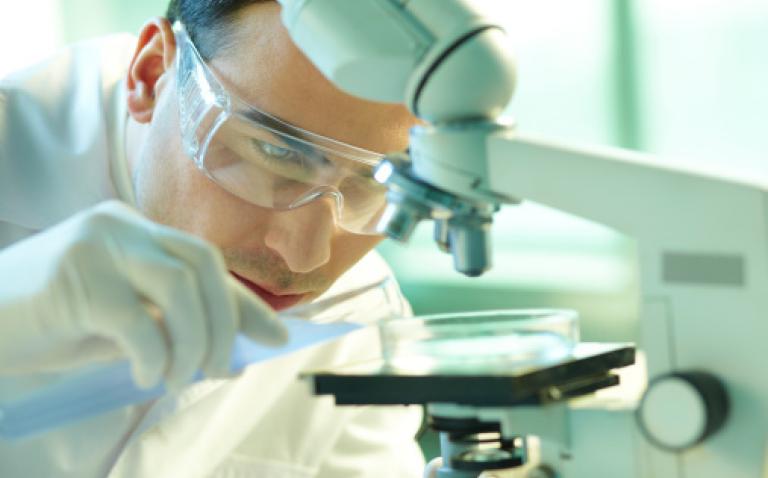The Digital Pathology Centre of Excellence is jointly developed by the Trust, Coventry and Warwickshire Pathology services (CWPS), the University of Warwick, and Omnyx, LLC, a joint venture of GE Healthcare and UPMC (University of Pittsburgh Medical Center).
A year ago, the Trust, in conjunction with CWPS, became the first in the country to use software and digitised slides of tissues for clinical diagnosis, allowing pathologists to view samples in high resolution on their computer screens and from any location.
Previously, pathologists worked from physical slides, which are unique, so had to be kept on file in a lab and transported if they needed to be taken to a different location.
Using the OmnyxTM Integrated Digital Pathology system, once the tissues have been processed onto slides, they are now scanned into the pathology computer system so the pathologist can access them securely from another site.
Digitised slides have a number of important advantages. Pathologists can securely access them from any location, get second opinions from colleagues in other sites, or even other countries, and can explore the role of computer-assisted analysis that is not feasible with conventional microscopes. Digital pathology also has the ability to cut slide-processing time by 12%.
Using a digital system also avoids any physical samples being lost or damaged, especially during transport.
Over the last year, 3014 cases have been viewed both digitally and on a microscope to ensure there are no discrepancies between the two.
One of the most exciting aspects of Omnyx and digitising pathology slides is the possibilities it opens up for computer-assisted analysis, such as tumour grading, which could have huge benefits for patients.
While diagnosing for prostate cancer, there are potentially nine grades of a tumour. Currently, pathologists make a decision of what grade the tumours are using their eyes, a microscope and their experience, usually supported by a second opinion from a colleague using the same technique. Defining the tumour grade is one of the major factors in deciding which treatment option is recommended to the patient. Those over a grade 4 may be offered surgery or radical radiotherapy, but those under would not.
Computer-aided quantitative algorithms are expected to further improve a pathologist’s performance and reliability, as well as provide more enhanced tumour grading.
The Centre of Excellence will focus on discovering new ways to use digitisation, like computer-assisted algorithms, in the diagnosis process. Achieving Centre of Excellence status means that the partnership in Coventry and Warwickshire is even closer to making this a reality.
Dr David Snead, Consultant Histopathologist and Clinical Service Lead for CWPS and UHCW NHS Trust, said: “This is a really proud day for me and all my team.
“Becoming a Centre of Excellence for Digital Pathology is fantastic for UHCW. This project has been five years in planning and implementation, and it is wonderful to see it coming to fruition. It is really good news for our patients, as we will be able to offer even better care to them than ever before.
“We have a fascinating journey ahead of us as we start to implement the powerful tools that we have helped to develop, with Professor Rajpoot and his colleagues at the University of Warwick, and begin to see how these improve patient care.”
Andy Hardy, Chief Executive Officer of UHCW NHS Trust, said: “I’m delighted that we have been named a Centre of Excellence for Digital Pathology.
“This announcement means that the hard work by our pathologists has received world-class recognition.
“The new technology, which UHCW was the first Trust in the country to use, has already made a huge difference, and the possibilities are incredible.”
Professor Sudhesh Kumar, Dean, Warwick Medical School,said: “This is an exciting development that could transform the practice of pathology and I am pleased to see the Centre of Excellence in Digital Pathology at UHCW coming to fruition.
“This facility will provide some unique opportunities for research and also state of the art teaching of pathology for our medical students.”
Mamar Gelaye, CEO of Omnyx, said: “This announcement signifies great thought leadership on the part of our colleagues at UHCW in developing emerging Pathology practices using digital tools.
“It bolsters our resolve at Omnyx to deliver leading Digital Pathology capabilities to the United Kingdom through sound research and clinical adoption. We are proud of our collaboration with UHCW and anticipate significant gains both to the Trust at large and to pathologists around the world.”










